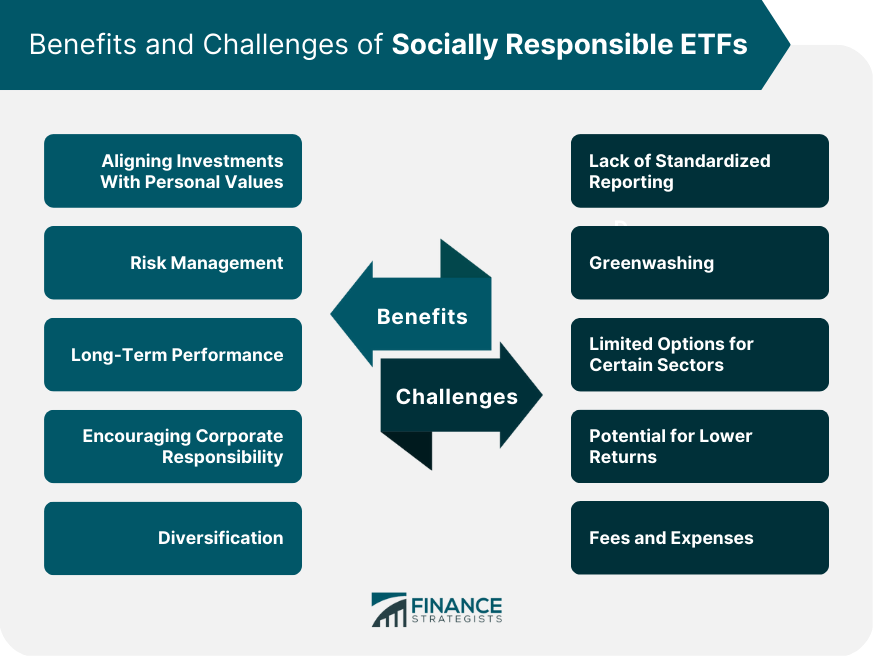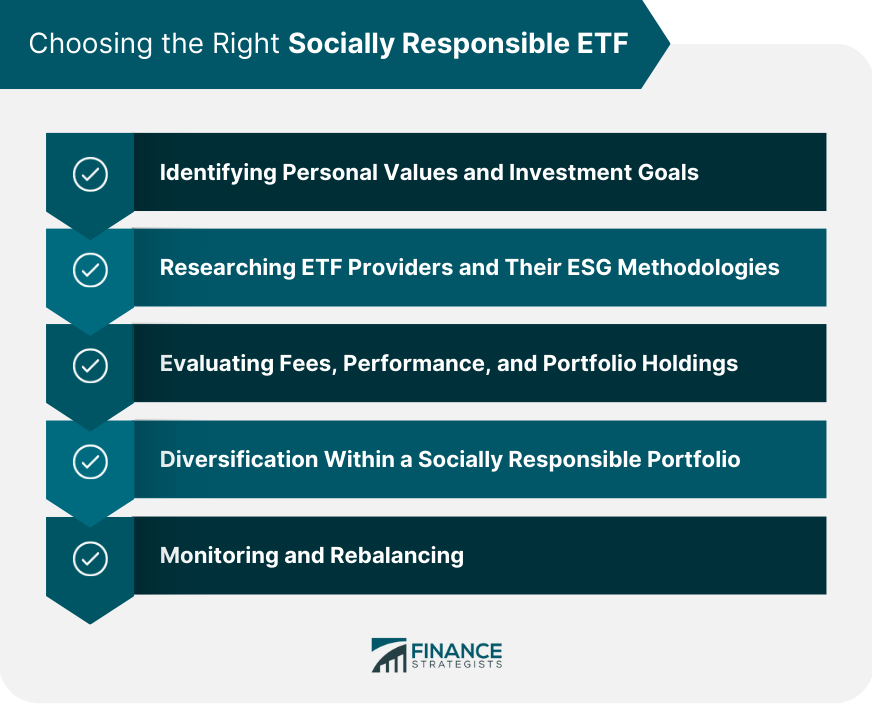Socially responsible exchange-traded funds (ETFs) are investment funds prioritizing companies that meet specific environmental, social, and governance (ESG) criteria or that address societal challenges. These ETFs allow investors to align their investment portfolios with their personal values while potentially reducing portfolio risk, encouraging corporate responsibility, and providing diversification. Socially responsible investing (SRI) has gained significant traction in recent years as more investors seek to align their financial goals with their personal values. One popular investment vehicle for SRI is the exchange-traded fund, which can provide exposure to a diverse range of companies that adhere to specific environmental, social, and governance criteria. Socially responsible ETFs are typically built around companies that meet specific ESG criteria. These criteria can include: Environmental Considerations: Assessing a company's impact on the environment, including its carbon footprint, resource management, and waste reduction efforts. Social Considerations: Evaluating a company's relationships with its employees, customers, and communities, such as fair labor practices, diversity and inclusion, and community engagement. Governance Considerations: Examining a company's management structure, board composition, executive compensation, and shareholder rights. Some socially responsible ETFs focus on impact investing, which seeks to generate measurable positive social and environmental outcomes alongside financial returns. This approach often involves investing in companies that address global challenges, such as climate change, poverty, or access to education and healthcare. Exclusionary screening is a strategy some socially responsible ETFs use to avoid investments in companies or industries that do not align with an investor's values. This can include sectors such as tobacco, weapons, gambling, or fossil fuels. Thematic investing involves selecting investments based on specific themes or trends, such as renewable energy, gender diversity, or water scarcity. Socially responsible ETFs can be designed around these themes, providing investors with targeted exposure to companies that address these issues. Socially responsible ETFs allow investors to align their investment portfolios with their personal values by focusing on companies that meet specific ESG criteria or address societal challenges. Investing in companies with strong ESG performance can potentially reduce portfolio risk, as these companies may be better equipped to manage environmental, social, and regulatory risks that could negatively impact their financial performance. Research has shown that companies with strong ESG performance can often deliver competitive financial returns over the long term, suggesting that socially responsible ETFs can provide an attractive investment opportunity. By directing capital toward companies that prioritize ESG factors, socially responsible ETFs can encourage businesses to adopt more sustainable and responsible practices. Socially responsible ETFs can offer investors diversified exposure to companies across different sectors and regions, thereby reducing the concentration risk associated with individual stocks. One challenge faced by socially responsible ETFs is the need for standardized reporting, which can make it difficult for investors to accurately assess a company's ESG performance and compare it to its peers. Greenwashing is the practice of misleading investors about a company's ESG performance or commitment to sustainability. This can concern socially responsible ETFs, as some companies may attempt to inflate their ESG scores to attract investment. Socially responsible ETFs may have limited options in certain sectors, such as energy or mining, where finding companies that meet stringent ESG criteria may be more challenging. While many studies have shown that strong ESG performance can lead to competitive long-term returns, there is still a possibility that socially responsible ETFs may underperform compared to their traditional counterparts in certain market conditions or timeframes. Socially responsible ETFs may have higher fees and expenses than traditional ETFs, as selecting and monitoring ESG-compliant companies can be more complex and resource-intensive. Several well-established ETF providers offer a range of socially responsible ETFs, including BlackRock (iShares), Vanguard, Invesco, and State Street Global Advisors (SPDR). Low Carbon ETFs: These funds focus on companies with low carbon emissions or those involved in developing clean energy technologies. Gender Diversity ETFs: These funds invest in companies that demonstrate a commitment to gender diversity at the board and executive levels. Sustainable Resource ETFs: These funds prioritize companies that efficiently manage and utilize natural resources, such as water or land. Ethical ETFs: These funds avoid investments in companies involved in controversial industries or practices, such as tobacco, weapons, or fossil fuels. While performance can vary depending on the specific ETF, research has generally shown that socially responsible ETFs can deliver competitive returns compared to their traditional counterparts, particularly over the long term. Before selecting a socially responsible ETF, investors should consider their values and investment goals to determine which ESG criteria or themes are most important. Investors should research different ETF providers and their ESG methodologies, including how they select and weigh companies within the fund, to ensure alignment with their personal values and goals. When comparing socially responsible ETFs, investors should consider factors such as fees, historical performance, and portfolio holdings to determine which fund offers the best potential for achieving their investment objectives. Investors should aim to diversify their socially responsible portfolio by including ETFs that cover different sectors, regions, and themes to reduce the concentration risk associated with individual investments. Regularly monitoring and rebalancing a socially responsible portfolio can help investors maintain their desired risk level and stay aligned with their investment goals. As governments and regulators increasingly focus on sustainability, new policies and regulations may drive further growth in the socially responsible ETF market. As awareness of ESG and SRI issues continues to grow, investor demand for socially responsible ETFs is expected to increase, driving innovation and product development in the space. Improvements in technology and data analysis capabilities may help address current challenges in ESG reporting and enable more accurate and consistent assessment of companies' ESG performance. As the market for socially responsible ETFs grows, investors can expect a wider range of investment options catering to specific ESG themes, sectors, and risk profiles. Increased engagement between investors and corporations can lead to more meaningful dialogue on ESG issues and drive positive change in corporate practices. Socially responsible ETFs allow investors to align their investment portfolios with their personal values by prioritizing companies that meet specific environmental, social, and governance (ESG) criteria or that address societal challenges. By investing in socially responsible ETFs, investors can potentially reduce portfolio risk, encourage corporate responsibility, and diversify their investments. However, socially responsible ETFs also face challenges, such as the need for standardized reporting, the potential for greenwashing, and limited options in certain sectors. When choosing a socially responsible ETF, investors should consider their personal values and investment goals, research different ETF providers and their ESG methodologies, evaluate fees and performance, diversify their portfolio, and regularly monitor and rebalance their investments. To ensure that your investment strategy aligns with your personal values and financial goals, consider hiring a wealth management professional who can guide you through the selection process and provide ongoing advice and support. What Are Socially Responsible ETFs?
Principles of Socially Responsible ETFs
Environmental, Social, and Governance (ESG) Criteria
Impact Investing
Exclusionary Screening
Thematic Investing
Benefits of Socially Responsible ETFs
Aligning Investments With Personal Values
Risk Management
Long-Term Performance
Encouraging Corporate Responsibility
Diversification
Challenges and Critiques of Socially Responsible ETFs
Lack of Standardized Reporting
Greenwashing
Limited Options for Certain Sectors
Potential for Lower Returns
Fees and Expenses

Popular Socially Responsible ETFs
Overview of Leading SRI ETF Providers
Examples of Well-Known Socially Responsible ETFs
Performance Comparison With Traditional ETFs
Choosing the Right Socially Responsible ETF
Identifying Personal Values and Investment Goals
Researching ETF Providers and Their ESG Methodologies
Evaluating Fees, Performance, and Portfolio Holdings
Diversification Within a Socially Responsible Portfolio
Monitoring and Rebalancing

Future Trends and Developments in Socially Responsible ETFs
Impact of Regulations and Policy Changes
Growing Demand for ESG and SRI Investments
Technological Advancements in ESG Data Analysis
Expansion of Socially Responsible ETF Options
Collaboration Between Investors and Corporations for Positive Change
Conclusion
Socially Responsible ETFs FAQs
Socially responsible ETFs are exchange-traded funds that invest in companies meeting specific environmental, social, and governance (ESG) criteria or addressing societal challenges such as poverty or climate change.
Socially responsible ETFs allow investors to align their investments with their personal values while potentially reducing portfolio risk, encouraging corporate responsibility, and providing diversification.
Challenges of socially responsible ETFs include the need for standardized ESG reporting, the potential for greenwashing, limited options for certain sectors, the potential for lower returns, and higher fees and expenses.
To choose the right socially responsible ETF, investors should identify their values and investment goals, research different ETF providers and their ESG methodologies, evaluate fees, performance, and portfolio holdings, diversify within their socially responsible portfolio, and monitor and monitor and rebalance regularly.
Future trends in socially responsible ETFs include the impact of regulations and policy changes, growing demand for ESG and SRI investments, technological advancements in ESG data analysis, expansion of socially responsible ETF options, and increased collaboration between investors and corporations for positive change.
True Tamplin is a published author, public speaker, CEO of UpDigital, and founder of Finance Strategists.
True is a Certified Educator in Personal Finance (CEPF®), author of The Handy Financial Ratios Guide, a member of the Society for Advancing Business Editing and Writing, contributes to his financial education site, Finance Strategists, and has spoken to various financial communities such as the CFA Institute, as well as university students like his Alma mater, Biola University, where he received a bachelor of science in business and data analytics.
To learn more about True, visit his personal website or view his author profiles on Amazon, Nasdaq and Forbes.











